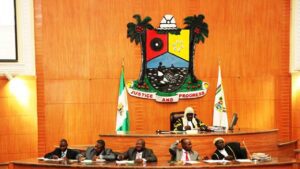
AfCFTA deal boosts Africa’s market with $3.4 trn GDP – Buhari
By Matthew Denis Abuja
President Muhammadu Buhari revealed that the recently executed African Continental Free Trade Agreement (AfCFTA) is a typical reference point as the deal has created a continent-wide market embracing 55 countries with 1.3 billion people and a combined GDP of $3.4 trillion.
The President made the disclosure at the opening ceremony of the 15th Annual Banking and Finance Conference in Abuja on Wednesday.
He said ” In the new Glocal context, the role and significance of the finance industry cannot be overstated in driving economic prosperity. The sector provides opportunities to create SME start-ups, expand existing business interests and create more jobs thereby pushing the local brand overseas to frontier markets.
“Therefore, repositioning the finance services industry involves valuable innovations to ensure global solutions reach local indigenous customers.
” The recently executed African Continental Free Trade Agreement (AfCFTA) is a typical reference point. The deal creates a continent-wide market embracing 55 countries with 1.3 billion people and a combined GDP of US$3.4 trillion.
The President stressed that Its first phase which took effect in January, 2021 would gradually eliminate tariffs on 90 percent of goods and reduce barriers to trade in services.
“In repositioning itself, the finance sector would serve not just as an intermediary for lenders and borrowers but in creating a new ecosystem consisting of platforms where ordinary Africans can buy and sell their locally made products despite currency disparity as being practiced on the Pan-African Payment and Settlement System (PAPSS), a brainchild of Afrexim Bank. “According to him the theme of this year’s conference “Repositioning the Financial Services Industry for an Evolving Glocal Context” is most apt in view of the need to constantly adapt internationally acceptable best practices to improve the efficiency and effectiveness of the sector in playing its primary role of holding financial assets, financial intermediation and capital formation.
He said ” The expediency of discussions on repositioning the sector within an evolving glocal context cannot be over-emphasized as it stands to benefit from the experiences of other nations in navigating through emerging issues such as the fall-out from the COVID-19 Pandemic and the on-going Russian-Ukraine war which have global implications on financial service delivery in local economies.
“This will enable participants and industry players gain new knowledge and insights to address emerging challenges and optimize the opportunities within the Nigerian financial sector.
“Other opportunities for the repositioning of the Nigerian financial sector to promote financial inclusion and the diversification of the nation’s economy include the following:Deepening the market and expanding product offering across the various segments of the industry to adequately finance Nigeria’s infrastructure and business investment needs as well as developing strategies to encourage Insurance penetration in Nigeria.
“Leveraging on the growing Non-Banking Financial Institutions (NBFIs) in the country to crowd in capital from pension funds and insurance assets through well-structured and risk-mitigated financial instruments to broaden and deepen the country’s financial markets.
“Deploying innovations in Fintech for the extension of financial services to the under-served population as well as expanding the product space by taking advantage of the opportunities provided by other digital trading platforms such as Warehousing, Collateral Management and Crowdfunding. Raising funds to finance the infrastructural needs through the issuance of revenue bonds, securitizing government assets and adopting other private finance arrangements, that allow private sector to provide services and infrastructure to the public transparently and competitively, thereby allowing for efficiency and improved revenue generation.
He noted that over the past seven years, our administration has through various initiatives supported the repositioning of the Nigerian economy within an evolving Glocal Context including government’s support of the Nigeria’s creative industry and indigenous Small and Medium-sized businesses as well as the agricultural sector which have enhanced the capacity of indigenous enterprises to compete with their counterparts from other countries. These efforts would be sustained and extended to more sectors of the economy.
“It is important state that the resolution of global issues within the local context will continue to give impetus for economic prosperity in our local communities. Let me at this point, highlight some of the key socio-economic issues which are currently being tackled at both local and global levels; Climate Change, Eroding Purchasing Power Due to Inflation and Insecurity.
“May I emphasize that we need a Nigeria of the future that harnesses her strengths, competences, and cultural diversity to tackle the challenges that plague her people, from climate change to pandemics, and insecurity. “He noted that the Government will continue to formulate and implement policies that are aimed at promoting self-sustenance in critical areas such as energy, agriculture, health, technologies and awaits the outputs of this Conference as inputs for the process.



